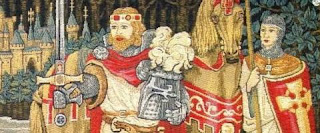I have persuaded the Producers to let you have a sneak peek at the show (thank you to Avital for the lovely photos!) - but since we all hate spoilers, I'm not going to tell you what is happening in each shot. Will match the picture to lines from previous LOGON shows. How many can you identify? Boast in the comment section below! So here we go - let's start with an easy one. Here is Dr. Albert Jacobs, our Orchestra Steward:
".... trying to scratch out a simple living, without breaking our necks"
Our court Jester and one of the Pages:
"O-oh the Wells Fargo Wagon is a-coming down the street; I wish I wish I knew what it could be!"
How about one of the King and Queen, in their casual clothes?
"I think I want a Western. Do you want a Western?"
The relationship between a Knight and his Squire is a complex thing:
"I could have danced, danced, danced all night!"
LOGON founder Ed Spitz is the magical mystical Merlin:
"Good night ladies, good night ladies, good night ladies, we're going to leave you now"
Two other long-time LOGON stalwarts, Sir Leon and Sir Arnie:
"Break a leg.... or we'll do it for you."
There's usually one great number for the male chorus, and this show is no exception. That's the evil Mordred front and center:
"To life, to life, l'chaim!"
And big numbers for the whole chorus, too:
"This was a real nice clambake, and we all had a real good time"
One of our producers, Alan Cohen, aka Sir Lionel:
"Oh what a beautiful morning, oh what a beautiful day...."
And finally, let's have a close-up of King Arthur and Sir Pellinore:
"Anything you can do, I can do better"
It's an amazing show, a comedy and a tragedy at the same time, with manly men and a beautiful queen, famous songs ("If Ever I Would Leave You", "I Loved You Once In Silence"), swordfights and a miracle and a human of the female persuasion who thinks she's a dog (a pointer).
COME SEE US for One Enchanted Evening! Details of performances and ticket sales:












































